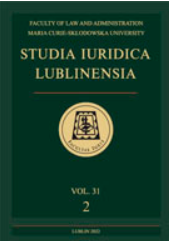Remarks on the Question of Cessation of the Running of Limitation Period for Amenability to a Penalty (Selected Issues)
Remarks on the Question of Cessation of the Running of Limitation Period for Amenability to a Penalty (Selected Issues)
Author(s): Ireneusz NowikowskiSubject(s): Law, Constitution, Jurisprudence, Criminal Law
Published by: Wydawnictwo Naukowe Uniwersytetu Marii Curie-Sklodowskiej
Keywords: extension of the limitation period for the offence; limitation period; Penal Code; criminal proceedings
Summary/Abstract: The author discusses the regulations concerning cessation of the running of limitation period for amenability to a penalty contained in the Act of 13 June 2019 amending the Penal Code and certain other acts, in the draft Act amending the Penal Code and certain other acts of 16 September 2021, and in the Act of 7 July 2022 amending the act – Penal Code and certain other acts. The Constitutional Tribunal in its judgment of 14 July 2020 (Kp 1/19) decided that the Act of 13 June 2019 amending the Penal Code and certain other acts was incompatible in its entirety with Article 7 in conjunction with Article 112 and Article 119 (1) of the Polish Constitution. According to the Constitutional Tribunal, the reason for the defectiveness of this law was the Sejm’s failure to observe the correct procedure for the adoption of this law as provided for in the Constitution. Under the proposed regulation, in the case of a reasonable suspicion of another offence found in the course of criminal proceedings, the criminality of this newly disclosed offence was supposed to be extended as set out in Article 102 § 1 of the Penal Code. A circumstance to cause an extension (or cessation) of the limitation period for a newly disclosed offence would be reasonable suspicion that the offence was committed. In that case, the amenability to a penalty for that offence would be temporally extended from the date on which the first evidence-taking activity was proceeded to determine whether that offence had been committed. The author criticized this proposal and put forward arguments challenging the validity of this amendment to the Penal Code. The discussion leads to the conclusion that the proposed amendment to Article 102 of the Penal Code does not guarantee that the time in which the circumstances justifying the extension of the limitation period for the offence would occur is precisely determined. The limitation period should be set in such a way as to allow precise determination of the lapse of that period. It determines the cessation of amenability to a penalty and thus the admissibility or inadmissibility of criminal proceedings. Moreover, the amendment does not guarantee that a reasonable suspicion of committing the crime arises. This, therefore, justifies the finding that legislation does not fulfil the guarantee (protection) function relating to statutes of limitation as a precondition of a criminal trial. For these reasons, the solution offered in proposed Article 102 § 2 of the Penal Code should be considered highly debatable.
Journal: Studia Iuridica Lublinensia
- Issue Year: 31/2022
- Issue No: 3
- Page Range: 203-232
- Page Count: 30
- Language: English

